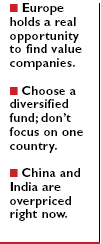Article
Invest abroad: think Europe
Investment Consult
It's a testament to the human spirit that despite earthquakes and terrorist attacks, societies continue to plow ahead, navigating the difficult conditions and forging ahead economically. As the US market continues to trudge up-ward-with a 4.9 percent average annualized return for the S&P 500 Stock Index in 2005-some foreign markets hold what I consider to be an above-average opportunity in the next three to five years.

Part of Europe's investing appeal stems from the fact that Europe isn't as efficient a market as the US. An "efficient" market means that all information about most companies and industries tends to be instantly known by analysts and investors, and is almost immediately factored into stock prices. In this country, it's hard for stockpickers to find something special or some new development that mutual fund managers and Wall Street aren't already on to, and which has already begun to raise the stock price.
There are some other factors that I also like about Europe: Companies are placing an increasing emphasis on cutting costs and becoming more profit-oriented. Mergers and acquisitions are more commonplace. Wage hikes have become quite modest-about 1 percent in Germany, for example-and that helps profits.
The final reason that I think it's wise to invest in Europe now is that the dollar is likely to decline in value over the next several years. That should give another boost to European investments, barring something unforeseen.
Some of my clients ask me, "Why not China and India? I keep hearing that they're growing rapidly."
I agree that China and India are going to be powerhouses. In India, however, stock prices have gotten too ebullient for me to want to invest now. I'm holding off. As for China, I think it's going to have a slowdown soon, and some experts call for it to happen this year. Besides, Chinese accounting systems aren't yet up to world standards.
Even though I figure Germany, France, and the United Kingdom will be the leaders in the European stock markets for the next two or three years, I'd vote against focusing on one or two particular countries. I'd go for a diversified mutual fund and leave it to the fund managers to choose the companies. Professional managers are better equipped to study the ins and outs of foreign companies, tax issues, and political situations that could impact companies' operations. Plus, you can more efficiently spread your risk over numerous holdings.
Focus on funds that hold primarily large-cap stocks-more specifically, large-cap value stocks. While I'm enthusiastic about international investing, I'd suggest limiting your foreign assets to no more than 10 to 15 percent of your portfolio.
These no-load funds are worth considering:
Oakmark International Fund is well regarded for its experienced and savvy managers and analysts. Europe gets about 70 percent of the assets, but Pacific Rim countries also take a bow, with Japanese and Korean companies among the top spots. The fund ranked in the middle of the pack among foreign funds in 2005, mostly due to being underweighted in Japan; but its smallish presence in Japan may have helped it when Japan's stock market plunged in January. Over the long term, the Oakmark International Fund has performed in the top 20 percentile of large-value foreign stock funds.





